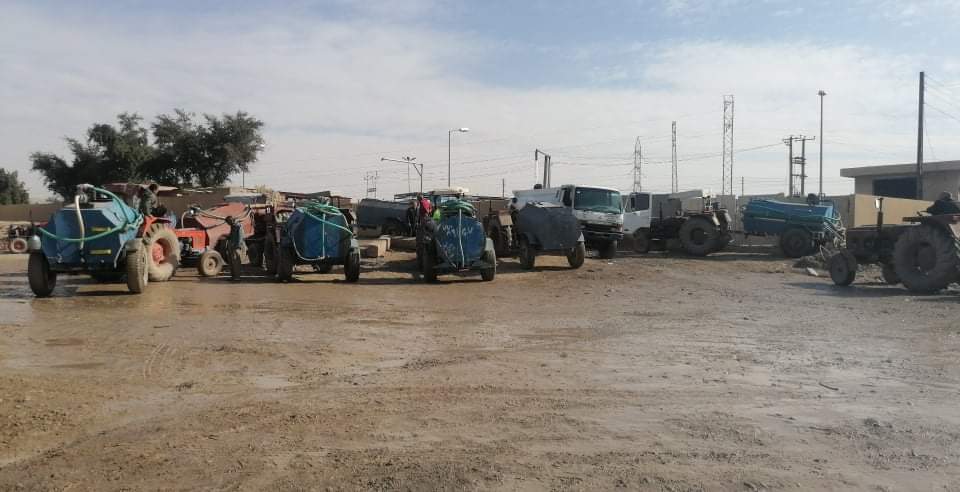Residents of several neighborhoods in one of districts of Salahaddin province complain about the absence of drinking water for a week, which prompted them to rely on purchasing water from mobile tankers, even though it is not suitable for drinking, according to some residents of those areas.
The crisis worsened after the company executing the tiling project on the main street in the district broke the water transmission pipelines on the pretext that these pipes must be laid at a deeper level underground in order for the company's teams to complete the tiling of the street.
Jamila Abbas, from the Kumari neighborhood in Tuz Khurmatow district, said, "We have been suffering from a drinking water crisis for a week, and our children cannot shower, and the price of water tanks reaches 15,000 Iraqi Dinars ($10), and the water from mobile tankers is not drinkable."
Mobile tanks are filled with water from the Tuz Khurmatu water project before it is filtered, while the government is reluctant to help citizens.
Jamila asserts, "We can’t afford buying water bottles that are sold in the markets, so we have to fetch water from other neighborhoods that do not suffer from this crisis."
It will take longer
Water networks for four areas in the district were damaged.
Early January, a group of residnents of Tuz Khurmatu launched a voluntary campaign to restore some of the main streets within the district due to the suspension of service projects, which the municipality attributed to the lack of the required budget.
The multi-ethnic district of Duz Khurmatu, located 70 kilometers south of Kirkuk and part of Salahaddin province, is the only disputed town of the province and one of the disputed territories between Erbil and Baghdad, home to 130,000 Turkmens, Kurds and Arabs.
The predominantly Sunni province of Salahaddin, about 135 kilometers north of the Iraqi capital, once home for Saddam Hussein, is under the control of Iraq's Shia-led paramilitary forces known as al-Hashid al-Shabi, the Popular Mobilization Forces PMF.
Heman Ali, a resident of the district, who has been complaining about the water shortage crisis for a week, complained, "They tell us that they will repair the pipes today or tomorrow and you will receive water, but that did not happen."
Hemin and six families living in the same area, decided to secure water from a neighboring area using plastic hose, for which they need a 700-meter hose.
"This will cost us a big amount, and the cost of buying water from tanks is also high, and not affordable for all families. The government had to find a solution to this problem," Hemin confirms, adding that "the water we buy is not suitable for drinking, because livestock and some citizens bathe in the project’s water.”
Local officials said they are aware of the road renovation and water service to be resumed soon.
Director of the Tuz Khurmatu Water Department, Issam Naqi Muhammad, told (KirkukNow), “the water pipes that supply these neighborhoods with drinking water are broken and are currently being rehabilitated, and the company that was paving the main street indicated that these pipes need to be in a deeper level.”
"We work daily to repair the pipes. The work was supposed to be finished today (Friday, January 28), but it will take longer," he added.
In late 2020, representatives of Kurds, Arabs and Turkmen residents of Tuz Khurmatu, visited Barham Salih, the Iraqi President, a Kurd, in Baghdad to request the provision of service projects such as roads, electricity, water, schools and the health sector. Despite the promises they obtained regarding the delivery of their demands to the government and their fulfillment, their efforts resulted in nothing.





